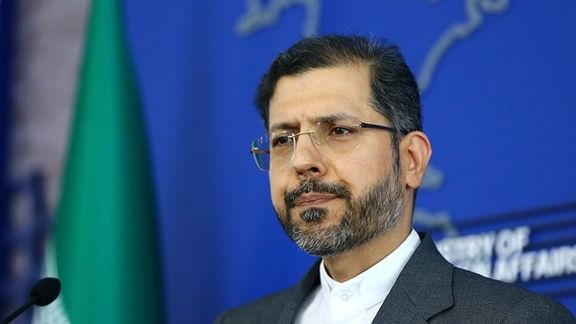Iran Says Nuclear Talks 'Hostage' To US Domestic Politics

Iran's foreign ministry said Monday the United States was responsible for the halt in the Vienna nuclear talks by failing to make a "political decision".

Iran's foreign ministry said Monday the United States was responsible for the halt in the Vienna nuclear talks by failing to make a "political decision".
"America is responsible for the halt of these talks and dragging it in coming days. The solution is in the White House. [The US] must give a logical response to Iran's request so that we can return to Vienna," Saeed Khatibzadeh told a weekly news conference in Tehran.
The spokesman did not say what was Iran’s proposal, but in recent weeks it has become clear that Tehran is asking Washington to remove the Revolutionary Guard from its list of foreign terrorist organizations.
Khatibzadeh reiterated that a deal to restore the 2015 nuclear deal, Joint Comprehensive Plan of Action (JCPOA), is within reach "if America realizes and knows for sure that we will not cross our red lines and demand," he told reporters adding that Tehran would "not wait forever" for the pact to be revived.
The Trump administration added the Revolutionary Guards (IRGC) to the US list of Foreign Terrorist Organizations (FTO), which is the only example of a sovereign state’s armed forces being so designated. Iran insists that delisting the IRGC is a requirement and 'red line' for a deal that it will not give up on.
US Special Envoy for Iran Robert Malley attending a conference in Doha last week said that he is not confident a nuclear deal between Western powers and Iran was imminent, adding that Washington would not remove the IRGC from its terror list.
"What happens in Vienna [talks] stems from the US approach which is trying to take the [solution of the] remaining issues hostage to its own domestic issues. Iran and Iranians can't remain patient forever," Khatibzadeh said referring to the delisting of the IRGC and strong opposition in the US Congress from Republicans and some Democrats.
Khatibzadeh’s remark about US “domestic issues” might be a reference to strong Congressional opposition to delisting the IRGC. Almost all Senate Republicans and many of their colleagues in the House of Representatives, as well as some Democrats oppose any concession on the issue.
Commenting on the European Union envoy in Vienna talks, Enrique Mora's, recent visit to Tehran the spokesman said Mora had received Iran's message and response to US demands. "We are still waiting for a response from the other party."
Mora met with foreign minister Hossein Amir-Abdollahian and top negotiator Ali Bagheri-Kani on March 27 to discuss the unresolved issues in the talks.
In a phone call with his Omani counterpart Sayyid Badr Albusaidi on Sunday, Amir-Abdollahian said Washington is directly responsible for the delay in reaching a nuclear deal.
Amir-Abdollahian criticized recent sanctions imposed by the US on some Iranian persons and companies, saying that Tehran is ready for a “good and lasting” agreement but the “American side has some maximalist demands and is directly responsible for the prolongation of the [nuclear] talks.”
Khatibzadeh also criticized the US for refusing entry to an Iranian vocalist last week to perform at an Iranian cultural event, presumably on the grounds that he had served his compulsory military service in the IRGC three decades ago.
Khatibzadeh also said that Iran does not tie regional issues to the nuclear talks and said Iran is prepared to resume talks with its regional rival, Saudi Arabia. "There is need for a clear agenda for the talks. We have offered our views to the Saudi side in written form. Our differences are clear and despite these differences we should seek to normalize our relations," he said.